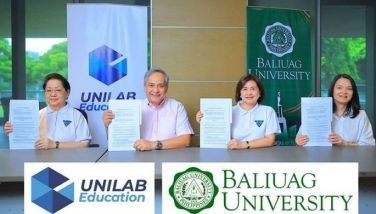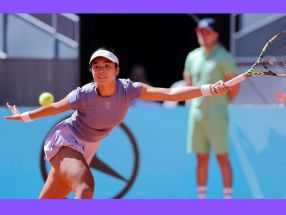Pinoys make waves in Paragames

The final tally showed the Philippines in fifth place in the medal standings of the recent sixth Asean Paragames in Solo, Indonesia. Topping the ladder was Thailand with 123 gold, 96 silver and 73 bronze medals. Next was host Indonesia with 113 gold, 108 silver and 89 bronze medals. Malaysia finished third with 51 gold, 36 silver and 45 bronze medals. Vietnam wound up fourth with 44 gold, 44 silver and 72 bronze medals. Then came the Philippines with 23 gold, 23 silver and 18 bronze medals.
But while the difference was glaring between No. 1 Thailand and No. 5 Philippines in terms of total harvest, it isn’t when you compare the efficiency ratio of athletes to medals. Thailand sent 205 athletes to Solo. As host country, Indonesia expectedly listed the largest contingent of 235 athletes. Malaysia had 122, Vietnam 121 and the Philippines only 48.
If you compute for the efficiency ratio, you’ll find Thailand still at No. 1 with a ratio of 1:1.42. But the Philippines is up at No. 2 with a productivity rating of 1:1.33. Third is Vietnam with 1:1.32 and fourth is Indonesia with 1:1.31. Fifth is Malaysia with 1:1.08.
Philippine Sports Association for the Differently-Abled and National Paralympic Committee of the Philippines president Michael Barredo was all praises for the showing of the lean and mean delegation. “It was a good performance considering a lean team made up of 48 athletes and 13 officials,” he said. “At the fifth Asean Paragames in Kuala Lumpur in 2009, we had 60 athletes and 15 officials and brought home 24 gold, 27 silver and 28 bronze medals for a total of 79.”
The Philippines’ productivity ratio in 2009 was 1:1.32, a shade lower than in the recent event where 870 athletes from 11 Southeast Asian countries battled for 337 gold, 338 silver and 333 bronze medals.
In Indonesia, the Philippines captured golds in swimming (7), athletics (4), table tennis (4), chess (3), tenpin bowling (3) and powerlifting (2). “Majority of the athletes who participated were physically challenged,” said Barredo. “They were in wheelchairs or athletes with polio or amputees followed by the visually impaired, blind and partially sighted and we had two intellectually disabled athletes.”
Barredo singled out powerlifter Adeline Ancheta for breaking the previous record of 115 kilos in the bench-press to bag the gold. She lifted 120 kilos to set the new mark in the up to and over 82 kilogram category. The other powerlifting gold medal for the Philippines came from Achelle Giuon in the 44 kilogram class.
The biggest winner in the Philippine delegation was Josephine Medina who claimed golds in four table tennis events – mixed doubles, women’s singles Class 6-10 open, women’s singles Class 7-8 and women’s team Class 10. Pocketing three golds each were swimmer Ernie Gawilan (100 meter backstroke, 200 meter individual medley, 400 meter freestyle S8) and chess player Sander Severino (single event rapid, team event, team event rapid). Delivering two golds apiece were swimmer Arnel Aba (200 meter individual medley, 400 meter freestyle S9), chess players Henry Roger Lopez and Alexis Elinon (team event, team event rapid) and runner Prudence Panaligan (200 meters, 400 meters).
The single gold contributors were swimmers Daniel Damaso (100 meter freestyle) and Josephine Beariza (50 meter butterfly), runners Roger Tapia (400 meters), Joel Balatulan (shot put), table tennis players Pablo Catalan (mixed doubles) and Minnie Cadag (women’s team), bowlers Ernesto Gatchalian Jr. (mixed doubles), Gina Espanol (mixed doubles), Kim Ian Chi (mixed singles) and Rufo Tablang (mixed singles) and powerlifters Giuon and Ancheta.
There were 11 sports in the Paragames calendar – archery, athletics, badminton, chess, goalball, powerlifting, swimming, table tennis, tenpin bowling, sitting volleyball and wheelchair tennis.
Of the country’s 48 athletes, 40 produced medals. The only sport where the Philippines competed and failed to collect a medal was archery. The Philippines sent entries in seven of the 11 sports in the schedule.
* * * *
Believe it or not, the irrepressible Graham Lim is still secretary-general of the Basketball Association of the Philippines (BAP) which was stripped of recognition by the Philippine Olympic Committee (POC) as the National Sports Association (NSA) for basketball to give way to the Samahang Basketbol Ng Pilipinas (SBP) in 2007.
“The BAP is alive,” said Lim. “Sen. Antonio Trillanes is the new BAP president. The BAP has nothing to do with the POC and FIBA. It is the SBP that works with the POC and FIBA. The BAP has members all over the country and will continue to run its programs on a local level. We don’t want to be involved in politics. We’re concentrating on barangay leagues. I will stay as BAP secretary-general until I’m replaced.”
Lim was jailed for seven months two years ago for allegedly falsifying his Filipino citizenship. The Bureau of Immigration even ordered his deportation. He was released under the custody of former National Press Club president Benny Antiporda after a bail of P100,000 was posted. Lim was supposedly released on condition he will inhibit himself from any involvement in sports.
“I suffered in jail in Bicutan where my cell neighbors were foreigners accused of grave crimes and even former Maguindanao Gov. Andal Ampatuan, Sr.,” said Lim. “My father was born in China but my mother was born in Tugegarao. I was born in the Philippines. Now, I realize my parents never fixed my citizenship and I took it for granted. But my Filipino passport was issued by the Department of Foreign Affairs. My passport is genuine. When I was declared stateless, even the NBI couldn’t classify my status because their program only recognizes countries. I am able to travel with a document issued by the Department of Foreign Affairs. I plan to formally apply for Filipino citizenship. I couldn’t be deported because no country would accept me. I am not from China or Taiwan.”
Lim said his Chiang Kai Shek classmates took care of his family while he was imprisoned. “I am grateful to my friends,” he said. “My wife and two children wouldn’t have survived without their help. My son is now 16 and going to college while my daughter is 13. Right now, I receive a salary as a consultant with the Federation of School Sports Associations of the Philippines under president David Ong.”
Lim was with the Philippine delegation of 58 athletes and 36 officials at the Universiade held in Shenzhen last August. The Universiade recognizes the federation as its official Philippine affiliate. There were 150 countries in the conclave that featured 306 events in 22 sports. Of the 150 countries, 65 collected medals and 42 at least a gold. The Philippines limped back home with a single medal – a silver from taekwondo’s Samuel Morrison of FEU. The Philippines competed in swimming, basketball, table tennis, badminton, chess, archery, beach volleyball, athletics and taekwondo. The contingent’s flagbearer was 6-10 center Junmar Fajardo of the University of Cebu whose varsity represented the country in basketball. The Cebu squad lost all its five games and even forfeited its game against South Korea in the consolation pool to go home.
Lim said the federation is linked to over 1,000 schools all over the country. If the federation is accountable for the Philippines’ showing at the Universiade last year, surely a change in leadership is in order. The Philippines was a disappointment and an embarrassment in Shenzhen.
- Latest
- Trending

































